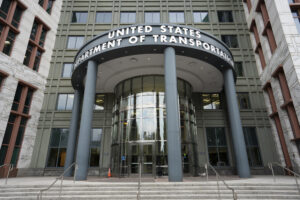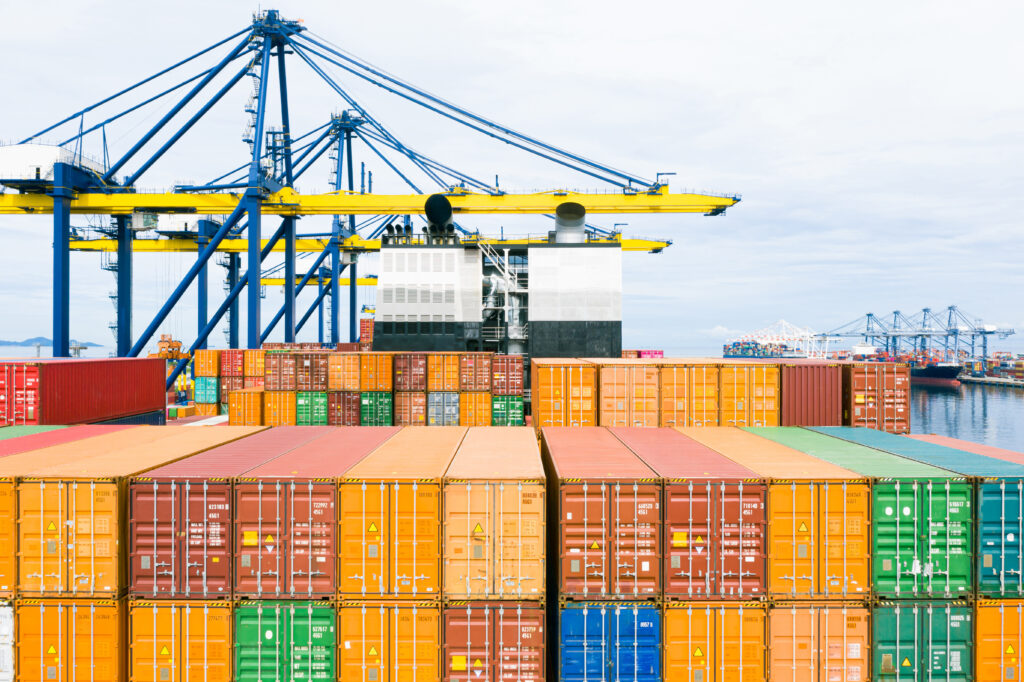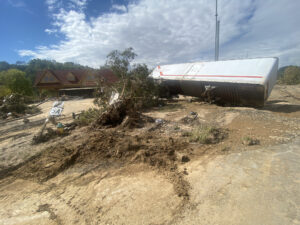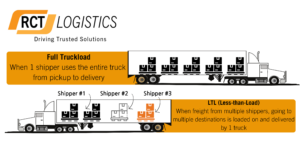Beat the Heat: Essential Tips for Protecting Trucking Shipments (and Yourself!)

Summer in the United States brings with it a unique set of challenges for the logistics industry: scorching temperatures. At RCT Logistics, we understand that safeguarding your valuable cargo is paramount. Extreme heat can significantly impact the integrity and quality of a wide variety of goods, leading to spoilage, damage, and costly losses. Effective trucking shipment protection in hot weather is not just a best practice; it’s a necessity.
That’s why we’ve put together these crucial tips to help you implement robust trucking shipment protection strategies this summer, ensuring your freight arrives at its destination in optimal condition. Of course, the well-being of our dedicated drivers is the top priority, so we’ve included essential reminders for staying safe in the heat as well.
Protecting Your Shipment from the Heat
Maintaining the integrity of your cargo is crucial, especially when temperatures soar. Implementing proactive trucking shipment protection measures can save significant time and money.
- Know Your Cargo’s Temperature Sensitivity:
- This is the absolute first step in effective hot weather freight safety. Different goods have different temperature thresholds. Always consult shipping documents and communicate with RCT Logistics dispatch if you have any questions about specific cargo requirements.
- Perishables: Food, pharmaceuticals, and certain chemicals demand strict temperature control.
- Electronics: Heat can degrade components, reduce battery life, and even cause malfunctions.
- Plastics and Adhesives: High temperatures can cause warping, melting, or reduced effectiveness.
- Liquids: Some liquids can expand or degrade under heat, leading to leaks or spoilage.
- Artwork and Delicate Goods: Extreme temperatures can cause irreversible damage.
- Utilize Refrigerated Trailers (Reefers) Properly:
For temperature-sensitive goods, reefers are your primary defense for temperature-sensitive cargo transport.- Pre-Cool Thoroughly: Ensure your reefer unit is functioning correctly and has reached the required temperature before loading any cargo. Avoid loading warm cargo into a hot trailer, as this strains the unit and can compromise product quality.
- Set and Monitor Temperatures: Double-check that the reefer is set to the precise temperature specified for the shipment. Regularly monitor the temperature display throughout your journey and note any significant fluctuations. Promptly report any issues to dispatch.
- Check Fuel Levels: Reefer units run on fuel. Always ensure adequate fuel levels to prevent unexpected shutdowns, especially on long hauls. We found an article about Reefer Trailer Maintenance that may be helpful.
- Strategic Loading and Airflow:
How cargo is packed and loaded directly impacts temperature distribution and is vital for preventing heat damage to cargo.- Proper Spacing: Avoid overcrowding the trailer. Leave adequate space between pallets and along walls to allow for proper air circulation, especially in reefers where cold air needs to move freely.
- Use Load Bars and Straps: Secure cargo to prevent shifting, which can block vents or damage packaging, compromising the shipment’s ability to withstand heat.
- Insulation (Where Applicable): For less-than-truckload (LTL) shipments, consider using thermal blankets or insulated packaging for individual sensitive items within a general freight trailer.
- Minimize Exposure to Direct Sunlight:
Even a non-refrigerated trailer can become an oven when exposed to direct sunlight. This directly impacts the effectiveness of your trucking shipment protection. - Shaded Parking: Whenever possible, park your trailer in shaded areas during stops, especially for extended periods. The sun beating down on the trailer roof and walls can significantly raise internal temperatures.
- Avoid Prolonged Idling in the Sun: If you have to wait, try to position your trailer to minimize direct sun exposure on the cargo side.
- Efficient Route Planning and Transit Times:
Plan your routes with heat in mind to optimize logistics heat management.- Prioritize Direct Routes: Minimize unnecessary detours or prolonged stops that could expose cargo to heat for longer periods.
- Off-Peak Transit: If feasible, coordinate with dispatch to schedule transit during cooler times of the day or night, especially for highly sensitive freight.
- Pre-Trip Inspections and Equipment Checks:
- Trailer Integrity: Before loading, conduct a thorough inspection of the trailer’s roof, walls, and doors for any holes, cracks, or worn seals that could allow heat or moisture to enter.
- Ventilation Systems: For dry vans, ensure any vents are clear and functioning as intended, especially if the cargo benefits from airflow.
- Clear Communication with Dispatch:
- Report Issues Promptly: If you notice any issues with your reefer unit, unexpected temperature spikes, or concerns about cargo integrity due to heat, contact RCT Logistics dispatch immediately. Early detection and communication can prevent significant losses. Visit our Contact Us page for support.
Protecting Yourself from the Heat: Driver Safety is Top Priority
While your cargo is critical, your health and safety come first. Protecting trucking shipments is not possible unless the driver is healthy. Remember these essential tips for driver safety in hot weather:
- Hydrate, Hydrate, Hydrate: Drink water consistently throughout the day. Avoid sugary drinks and excessive caffeine, which can lead to dehydration. Keep a cooler of water handy.
- Dress Appropriately: Wear light-colored, loose-fitting, breathable clothing (like cotton). A wide-brimmed hat and sunglasses are also recommended.
- Maximize Cab Cooling: Ensure your truck’s AC is in top working order. Use reflective sunshades when parked.
- Take Regular Breaks: Listen to your body. Pull over to a safe, cool location if you feel signs of heat exhaustion (dizziness, nausea, excessive sweating, headache, muscle cramps).
- Strategic Parking for Yourself: Seek out shaded spots for your truck during breaks to keep your cab cooler, benefiting both you and your cargo.
- Get Adequate Rest: Fatigue can exacerbate the effects of heat.
At RCT Logistics, we are dedicated to setting our drivers up for success and ensuring the safe and timely delivery of all shipments, even in challenging summer conditions across the United States. By diligently following these guidelines, you play a critical role in protecting trucking shipments and maintaining your own well-being on the road.
Stay cool, stay safe, ensure your shipments are secure – The RCT Logistics Team










